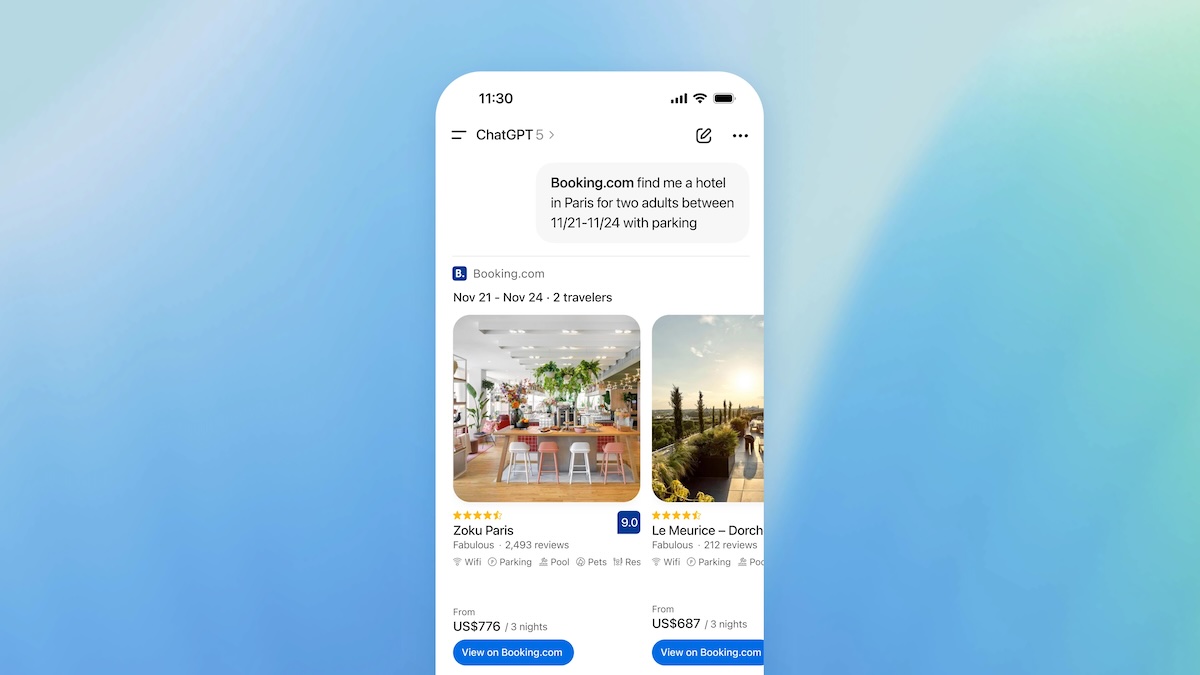The post Apps in ChatGPT: Forced to Stay? first appeared in the online magazine BASIC thinking. With our newsletter UPDATE you can start the day well informed every morning.

OpenAI has announced the integration of numerous well-known apps into ChatGPT. Users should be able to use the chatbot to create playlists, buy products or book flights, among other things. Although the function promises a lot of convenience, it is not harmless when it comes to data protection.
Background: Apps in ChatGPT
- According to OpenAI Apps in ChatGPT fit naturally into conversations. The chatbot should either at the right time Suggest them yourself or users can specifically call them up by naming them. The promise: more convenience – for example by creating playlists, searching for hotels or ordering products.
- The apps from Booking, Canva, Coursera, Figma, Expedia, Spotify and Zillow are now available in all ChatGPT versions – but only in the respective markets and outside the EU. Other partners such as Uber have already been announced. OpenAI has also announced the The function should also be made available to EU users in a timely manner.
- ChatGPT is designed to encourage users to do thisto connect the first time an app is used in chat. You would receive information about what data is shared with providers. These gain access to, among other things, personal information, files, contacts or calendars. OpenAI also learns more about its users through the direct use of apps in ChatGPT, but pushes responsibility away.
Classification: ChatGPT as an app for everything?
One App for everything: Elon Musk actually had this wish until after he took over Twitter (now X) for a whopping 44 billion euros. OpenAI is now apparently getting ahead of the richest man in the world.
Because with apps in ChatGPT, the company turns its chatbot into one potential all-rounder. Commuting between browser tabs, streaming services, booking portals or calls should be a thing of the past.
The promise: more user comfort. The goal: more interaction in ChatGPT. What undoubtedly brings convenience has primarily economic reasons.
Spotify and Co. are probably hoping to make their offering more attractive. Meanwhile, OpenAI is speculating on user loyalty. The overarching goal of all: data! Because DData is the fodder for algorithms.
Voices
- OpenAI boss Sam Altman explained on the OpenAI Dev Day 2025: “We want ChatGPT to help people make progress, be more productive and creative, learn faster, and do better at whatever they want to achieve in their lives. [Apps innerhalb von ChatGPT] will enable a new generation of interactive, adaptable and personalized chat apps.”
- Sten Garmark, Global Head of Consumer Experience at Spotify, is glad: “Spotify’s vision has always been to be wherever you are. By integrating Spotify with ChatGPT, we’re creating a powerful new way for fans to connect with the artists and creators they love, whenever they feel inspired.”
- I think: “If ChatGPT becomes the control center of apps, the line between comfort and control becomes blurred. Users receive a convenient interface, but they reveal significantly more about themselves and their behavior.”
Outlook: Apps in ChatGPT
Apps in ChatGPT will show how quickly a convenient assistant can become a digital gatekeeper. Because: If ChatGPT for Stage for Spotify, Booking, Uber and Co. the question is less what you use – but how often. The digital dialogue will then control which products, trips and ideas we come across.
A Chat (GPT) window could then be the last resort for many people between enthusiasm and loss of control. But while OpenAI and its app partners celebrate, an algorithmic dependency will grow in the background that will know users better than their calendar.
For the economy this means: new markets, new data flows, new power structures. Users, on the other hand, are becoming more and more Raw material for a new form of interaction – charmingly packaged, quite helpful, but more capitalistic than ever.
Also interesting:
- Sora: An AI app for deepfakes – from OpenAI
- Tilly Norwood: AI actress shocks Hollywood
- Pulse: ChatGPT now also responds without being asked
- The Wolfram Weimer experiment: First German minister with AI avatar
The post Apps in ChatGPT: Forced to Stay? first appeared on BASIC thinking. Follow us too Google News and Flipboard or subscribe to our newsletter UPDATE.
As a Tech Industry expert, I believe that the rise of chatbots and AI-powered apps like ChatGPT is a significant development in the tech industry. These apps have the potential to revolutionize the way we interact with technology and provide a more personalized and efficient user experience.
However, there are concerns about the potential for these apps to become too intrusive or overwhelming in our daily lives. The idea of being “forced to stay” in an app implies a lack of control and autonomy for the user, which could lead to negative consequences such as addiction or over-reliance on technology.
It’s important for developers and designers of these apps to prioritize user privacy, consent, and mental well-being in their designs. Users should have the ability to easily opt out of using the app or adjust their settings to limit their interactions if they feel overwhelmed or uncomfortable.
Overall, while apps like ChatGPT have the potential to enhance our lives in many ways, it’s crucial that we approach their development and usage with caution and mindfulness to ensure that they have a positive impact on society.
Credits